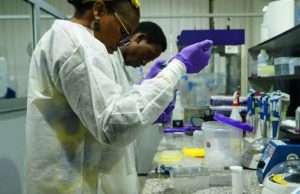Problems of science and technology Development in Nigeria: There has been an overwhelming need by people to explain experiences, sicknesses whilst seeking their cure, and make life easier using scientific explanations to birth technology.
Science is simply described as the mother of all inventions. It involves the systematic research, intensive study into the structure of the environment, persons (both living and dead) and an inquiry into their characteristics. For science, it doesn’t just end in the enquiry. The facts derived are further researched upon, tested, observed and experimented upon.
Technology however is the application of scientific knowledge. Science tells us about the existence of motion, technology invents objects that move.
In our society, science and technology can be seen as they are inevitable in our daily applications. From the vehicle used to transport ourselves to the office, to the microwave used to warm food, to the television and even our smart phones. We should not forget the existence of drugs to which people had died of earlier before the cure became known.

Recommended: Why is africa backward in science and technology
Benefits of science and technology in Nigeria
Before delving fully into the topic at hand, it is important to explain the benefits of science and technology in Nigeria. A few of them are:
1. Science serves as a source from which ideas are generated to better lives: Science involves researching into the state of things, seeking answers as to why things are the way they are, and seeking solutions by generating ideas, experimenting on the solutions founded by the ideas and observing to find out if really it has found the perfect solution.
This whole process, though time consuming, ends up in the creation of a high quality living. Take for instance, the creation of washing machine was to solve the problem of manual washing.
2. Helps save time and reduces expenses: A while ago, pre 2000’s, there were no phones in Nigeria. People communicated using letters and physical meeting.
Thanks to the internet and GSM phones, we can send information to a wide range of people, regardless of their location wherever in the world at the same time, and can also see them using video calls.
Also see: Most profitable skills to learn in 2022
3. Creation of machines and health equipment: Africa is said to be the home of inventions, specifically Egypt. The creation of clocks, pyramid, machines for embalming bodies and other health equipment.
The other parts of the world picked up real quick. Science has helped in creating equipment which a lot of us due to the ease cannot imagine life through any other way.
Recommended: Advantages and Disadvantages of quantitative and qualitative research methods
Challenges/Problems facing science and technology development in Nigeria
1. Apathy on the part of the Leaders: In developed societies or aspiring to be, the people are usually encouraged by the political leaders to embrace science and technology, to do better, and to bring the country into the road map. This encouragement is expressed through the overt acts of the leaders which could be by way of scholarships, promoting skills by funding people, establishing schools to promote technological developments.

However, the reverse is the case in Nigeria and has thus led to an increased rate in migration. We have people with ideas, moving out of the country to other countries in search of greener pastures, countries welcoming of their innovations. That being said, the leaders need to show concern and interest in the country’s technological sector.
2. Little or no Funds: It is no secret that a lot of innovative Nigerians have ideas which if implemented would put the country on the radar of excellence. However, these people are handicapped, limited due to little or no funds. There is no organization seeking to help with funding certain technological projects in Nigeria.

It is a big shame that the country has no steady supply of electricity, and that so many industries and people have to resort to generator. This problem speaks volumes as to the state of things in the country. Science requires funds; funds to pay other collaborators, to get necessary components, to research.
Recommended: Notable scientists of all time and their inventions
3. Lack of Motivation: The average Nigerian is not motivated to stride towards innovation and technology. This is because he or she is aware of the economic state of the country, knows that without work there would little or no food or even money for upkeep. Hence, they offer courses which they think are profitable upon graduation.

Examples are science students offering medicine, and pharmacy, not to develop drugs but to work in a hospital and earn their pay. This problem would be a thing of the past if there are individuals, organizations and the government willing to support these individuals with their innovative ideas and help push them to bring those ideas into reality.
4. Poverty: This is the major cause of the low rate of technology and science in Nigeria. A lot of Nigerians live below the dollar value per day. Sometimes a whole family feed below the value of one dollar in Nigeria.

A hungry person is not the type to pursue a career in science and technology. He most probably hasn’t figured out how to get his daily bread, talk more of pursuing a degree in the Uniersity. Also, there are no avenues open for him; no visa to travel out of the country to learn from other countries, no quality education, no money to get necessary components, no money to watch the process via the internet.
Also see: Advantages and Disadvantages of shopping online
5. Low Level or Quality of Education: Technology would be a more common thing if most of the citizens are educated well enough to build and create scientific projects. Where majority of the citizens are either school drop outs due to inadequate funds or truancy, or they stopped schooling after primary school, they cannot create things of value.

Education keeps one informed, it broadens the view of the person involved. However, in Nigeria, the standard and quality of education is low. ASUU keeps going on frequent strikes due to unpaid salaries, schools are dilapidated, lecturers flout school time tables, sex for grades, bribery and corruption in the education sector. All these and more, affect the quality of the education student receive.
6. Inferiority Complex: Inferiority complex is the feeling of being inferior to others. This is one major issue affecting the Nigerian market. A lot of Nigerians would rather buy imported goods at expensive rates than buy goods made in Nigeria due to the fear that if made in Nigeria, there is a high probability that it is of inferior quality. This attitude is one of the major problems of science and technology in Nigeria.
Also see: Major uses of the computer
7. Corruption: Corruption has eaten so deep into the Nigerian system. People are mostly employed not based on their skills, but who they know. Meritocracy has been swept under the carpet. Ethnicism, bribery, favouritism has become the order of the day.

Even individuals willing to help aid and finance certain financial projects are scared of being scammed, scholarships are awarded not to the people who merited them, but people who bribed their way through.
Recommended: Art and science, which is more important? Answered
In conclusion, in the present day world, technology is the order of the day as most, if not all, of the activities carried out day to day require the use of science and technology. To compete, with the outside world, a lot has to be done to help get rid of these problems. The government has a great role to play everyone has a role to play.

Edeh Samuel Chukwuemeka, ACMC, is a lawyer and a certified mediator/conciliator in Nigeria. He is also a developer with knowledge in various programming languages. Samuel is determined to leverage his skills in technology, SEO, and legal practice to revolutionize the legal profession worldwide by creating web and mobile applications that simplify legal research. Sam is also passionate about educating and providing valuable information to people.